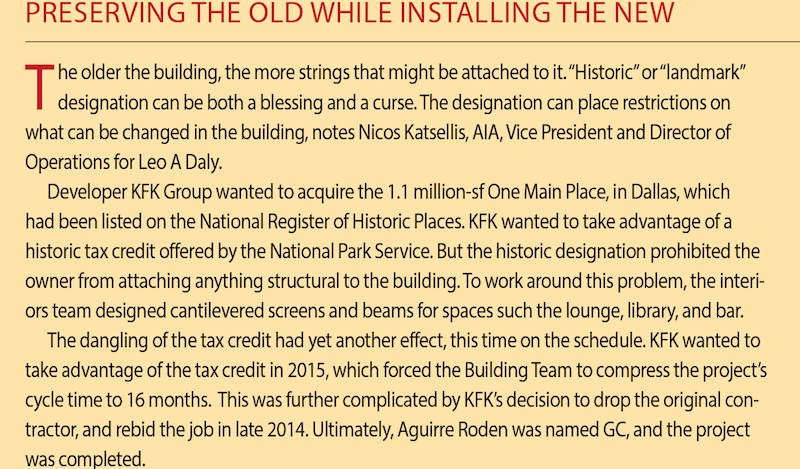The buzzword in real estate circles these days is asset repositioning—taking a down-on-its-luck property, usually an older office building, and revaluing it through reconstruction.
TOP 130 RECONSTRUCTION ARCHITECTURE FIRMS
Rank, Firm, 2015 Revenue
1. Beck Group, The $316,027,821
2. Stantec $231,765,480
3. IMC Construction $225,000,000
4. HOK $112,706,000
5. HDR $110,180,000
6. CannonDesign $102,600,000
7. Perkins+Will $101,690,400
8. HGA $85,650,000
9. HKS $72,760,766
10. DLR Group $63,000,000
TOP 110 RECONSTRUCTION CONSTRUCTION FIRMS
Rank, Firm, 2015 Revenue
1. Gilbane Building Co. $2,127,487,000
2. Turner Construction Co. $1,931,117,760
3. Whiting-Turner Contracting Co., The $1,404,237,262
4. PCL Construction Enterprises $1,303,288,338
5. Balfour Beatty US $1,214,992,385
6. Pepper Construction Group $832,830,000
7. JE Dunn Construction $804,928,900
8. Consigli Building Group $777,521,827
9. DPR Construction $759,149,850
10. Shawmut Design and Construction $704,000,000
TOP 70 RECONSTRUCTION ENGINEERING FIRMS
Rank, Firm, 2015 Revenue
1. Jacobs $416,783,478
2. Robins & Morton $339,995,669
3. Boldt Company, The $195,086,494
4. Burns & McDonnell $176,706,584
5. IPS $141,876,000
6. WSP | Parsons Brinckerhoff $136,804,000
7. Jensen Hughes $104,807,939
8. Benham Design $102,458,168
9. Wiss, Janney, Elstner Associates $71,632,800
10. Dewberry $60,223,172
More often today, such projects sprinkle in fresh mixed-use ingredients—apartments, condos, retail outlets, restaurants, even entertainment venues.
“It all comes down to amenities and the quality of the space,” says John Clegg, AIA, LEED AP, Principal of Design in Page’s Houston office.
Reconstruction, says Clegg, is always a balancing act between the client’s pro forma and what the building needs to be vibrant again. Page’s work at 1100 Louisiana in Houston is an example of a low-cost solution that involved refreshing the lobby with new furniture, lighting, signage, and amenities—in this case, a Starbucks.
At 811 Louisiana, more drastic measures were called for. A major tenant had moved out, and the owner needed to attract a new lessee. Page proposed resetting the interiors of the first five floors and recladding the exterior to give the building greater curb appeal. The desired effect was to “change the identity of the building itself,” says Clegg.
One Main Place, in Dallas, is another example of a distinguished property that had fallen on hard times. One Main Place was designed in the 1950s by Skidmore, Owings & Merrill’s Gordon Bunshaft, but it was only 30% leased after prime tenants like Bank of America and Ernst & Young had pulled up stakes.
ForrestPerkins, acting as architect of record and interior designer, led the conversion of the 10 upper floors of the 32-story structure into the Westin Dallas Downtown—326 guest rooms, two restaurants, a top-floor swimming pool, ballroom, and guest suite.
The second floor, with 25-foot-high ceilings, was converted into a public space. A porte cochère was added for the hotel. Separate entrances were provided for the ground-floor restaurant (NOLA Brasserie) and the offices. A 5,000-sf glass-enclosed Willow Pavilion was nestled within an existing 20,000-sf exterior sunken plaza.
“The thinking is that the hotel will raise the office space to a higher classification,” says Lawrence Adams, AIA, ForrestPerkins’s Principal in Charge.
Overcoming obstacles
In its renovation of the 109-year-old, 50,000-sf Van Antwerp building, the first reinforced concrete structure to be built in Mobile, Ala., the Building Team—Goodwyn | Mills | Cawood (architect), Thompson Engineering, and Doster Construction (GC)—preserved as much of the original structure as it could. They restored the terra cotta skin. They scanned pieces of the original exterior cornice to create a fiberglass replacement. The underside of the cornice now features mounted glass panels with LED lighting.
The $24 million project had to deal with a foundation that was only 25 feet wide. The foundation had to be reinforced to allow an 11-story addition to be built on the existing 11-story property, says GMC’s Tracy Bassett.
Last year, Leo A Daly completed the conversion of a former mental hospital on the Veterans Administration’s campus in West Los Angeles, which had been abandoned for decades, to permanent therapeutic residences for 65 former homeless veterans. “We envisioned each of the private apartments as rehabilitative cocoons carved into the fabric of a historic structure,” said Michael Walden, Leo A Daly’s Director of Design.
Nicos Katsellis, AIA, LEED AP BD+C, EDCA, GGP, Vice President and Director of Operations for Leo A Daly, says the 46,000-sf concrete building, which dates to the 1940s, was structurally sound. But the firm completely renovated the interior, which included moving the center corridor to the side to expose it to more daylight, and installing clerestories with translucent panels over the corridor.
Windows were restored with energy-efficient glazing. The construction of residences had to take into account columns and windows that weren’t always spaced uniformly. To free up overhead space in the rooms, the team ran vertical duct shafts from the HVAC system in the attic into numerous areas of the building.

RETURN TO THE GIANTS 300 LANDING PAGE
Related Stories
Office Buildings | May 20, 2024
10 spaces that are no longer optional to create a great workplace
Amenities are no longer optional. The new role of the office is not only a place to get work done, but to provide a mix of work experiences for employees.
Mass Timber | May 17, 2024
Charlotte's new multifamily mid-rise will feature exposed mass timber
Construction recently kicked off for Oxbow, a multifamily community in Charlotte’s The Mill District. The $97.8 million project, consisting of 389 rental units and 14,300 sf of commercial space, sits on 4.3 acres that formerly housed four commercial buildings. The street-level retail is designed for boutiques, coffee shops, and other neighborhood services.
Construction Costs | May 16, 2024
New download: BD+C's May 2024 Market Intelligence Report
Building Design+Construction's monthly Market Intelligence Report offers a snapshot of the health of the U.S. building construction industry, including the commercial, multifamily, institutional, and industrial building sectors. This report tracks the latest metrics related to construction spending, demand for design services, contractor backlogs, and material price trends.
K-12 Schools | May 15, 2024
A new Alabama high school supports hands-on, collaborative, and diverse learning
In Gulf Shores, a city on Alabama’s Gulf Coast, a new $137 million high school broke ground in late April and is expected to open in the fall of 2026. Designed by DLR Group and Goodwyn Mills Cawood, the 287,000-sf Gulf Shores High School will offer cutting-edge facilities and hands-on learning opportunities.
Adaptive Reuse | May 15, 2024
Modular adaptive reuse of parking structure grants future flexibility
The shift away from excessive parking requirements aligns with a broader movement, encouraging development of more sustainable and affordable housing.
Affordable Housing | May 14, 2024
Brooklyn's colorful new affordable housing project includes retail, public spaces
A new affordable housing development located in the fastest growing section of Brooklyn, N.Y., where over half the population lives below the poverty line, transformed a long vacant lot into a community asset. The Van Sinderen Plaza project consists of a newly constructed pair of seven-story buildings totaling 193,665 sf, including 130 affordable units.
K-12 Schools | May 13, 2024
S.M.A.R.T. campus combines 3 schools on one site
From the start of the design process for Santa Clara Unified School District’s new preK-12 campus, discussions moved beyond brick-and-mortar to focus on envisioning the future of education in Silicon Valley.
University Buildings | May 10, 2024
UNC Chapel Hill’s new medical education building offers seminar rooms and midsize classrooms—and notably, no lecture halls
The University of North Carolina at Chapel Hill has unveiled a new medical education building, Roper Hall. Designed by The S/L/A/M Collaborative (SLAM) and Flad Architects, the UNC School of Medicine’s new building intends to train new generations of physicians through dynamic and active modes of learning.
Sustainability | May 10, 2024
Perkins&Will’s first ESG report discloses operational performance data across key metrics
Perkins&Will recently released its first ESG report that discloses the firm’s operational performance data across key metrics and assesses its strengths and opportunities.
MFPRO+ News | May 10, 2024
HUD strengthens flood protection rules for new and rebuilt residential buildings
The U.S. Department of Housing and Urban Development (HUD) issued more stringent flood protection requirements for new and rebuilt homes that are developed with, or financed with, federal funds. The rule strengthens standards by increasing elevations and flood-proofing requirements of new properties in areas at risk of flooding.

















